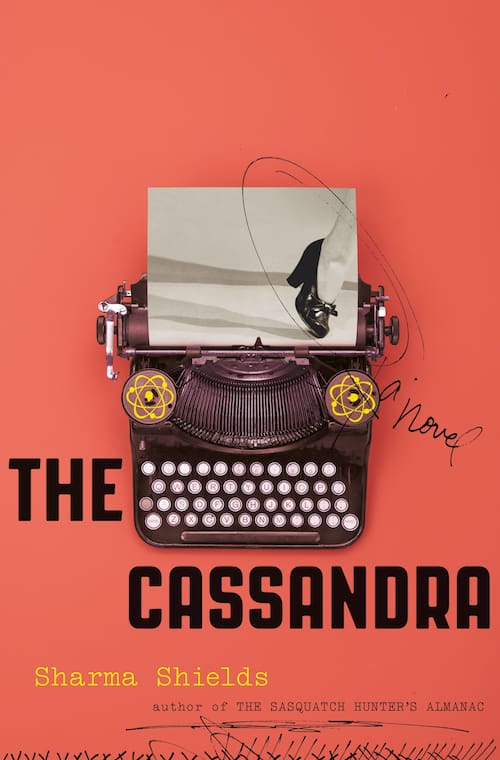interview by Sheila G. Miller
A young woman from a small Washington town takes a secretarial job at Hanford in the 1940s. One problem—she has visions of the future, and sees the environmental and humanitarian destruction to come from the work being done there.

In her new novel, The Cassandra, Spokane native Sharma Shields explores the scientific marvel and the tragedy of the Manhattan Project. Shields, who won the 2016 Washington State Book Award in fiction for her previous novel, The Sasquatch Hunter’s Almanac, talks to 1889 about the magic realism of her novel and why the book gets so dark.
You grew up in Washington. Did you learn about Hanford in school? How did you decide to write about the site and the Manhattan Project? We didn’t learn about it, and I heard just kind of random things about it that I never really understood growing up. When I was diagnosed with multiplesclerosis six years ago, sometimes when I’d tell people about the diagnosis they would say, ‘We have a huge incidence of that here because we’re downwind of Hanford.’ I never really knew what to make of that.
I was writing a mad scientist novel, a sort of modern retelling of Mary Shelly’s Frankenstein set in the Northwest, and it occurred to me when I heard about Hanford that it would be an awesome place for this mad scientist to work. Then I realized the history was really fascinating and instead I wrote a historical novel. I never really intended to do that.
This book is heavy on history—how did you research it?
Until August, I worked for the Spokane County Library District, so my research started on Proquest and the databases there. There was also a book I repeatedly checked out over and over, Atomic Frontier Days. And then there was this incredible website I still look up called Voices of the Manhattan Project (www.manhattanprojectvoices.org). But probably the most helpful thing was when they made the B Reactor a national park. I booked a tour months in advance, and I went over there and I got to explore the reactor, take a bus tour of the entire Hanford site. That really helped me ground the novel in this physical place that I couldn’t even imagine before visiting.
There is a lot of bad male behavior in this novel, and it is not nostalgic—it gets very dark. It became really important because of a quote I read by one of the women working there—“I look back now and realize this was a free country but we were living behind barbed wire at Hanford, all to protect womanhood. I know that where women were concerned, Hanford could either make you or break you.” When I started reading about the rapes that were taking place there and how they had to put up barbed wire, it became really important to me because of things that happened to me and to the women I cherish in my life. It was a way of really trying to bring to light how damaging that sort of chauvinistic thinking is in our country, not just at Hanford but around our country. I started writing this book five years ago, and I was not expecting it to be as timely as it has been. It’s a huge disappointment to me that we’re making steps forward but it still feels like, especially where our government is concerned and the patriarchy at play, women have an uphill battle. We’re still silenced and still told that the brutal experiences we’ve endured don’t matter compared to the experiences of men.
There’s a real thread of mysticism in this book, even as it’s set in the real world. Why was that important to you? I wanted the narrator to be both really vulnerable and also really exceptionally powerful. When I was thinking about the secrecy at Hanford, and then I was thinking about the Cassandra Myth and her ability to see things, I thought, ‘How cool would it be to have a character who does know what’s going on at Hanford?’ An everyday worker, not a high-end physicist or a general working on the project, who does understand everything that could possibly happen there. I love how the fantastic can really heighten the very emotional reality of apiece. Also I love how fun it is to write and can make it kind of fun to read, and it might even add a little levity to something that is filled with dread and despair like this book is.
Heather Anderson’s PNW events:
March 11 Village Books in Bellingham, WA https://www.facebook.com/events/363038634249498/
March 12 The Mountaineers Be Wild Speakers Series in Seattle https://www.facebook.com/events/721209158263284/
March 13 Browsers Bookshop on Olympia, WA https://www.facebook.com/events/302617560392339/
<
p style=”font-weight: 400;”>March 14 Patagonia Portland with Oregon Wild https://www.facebook.com/events/366525510594324/







